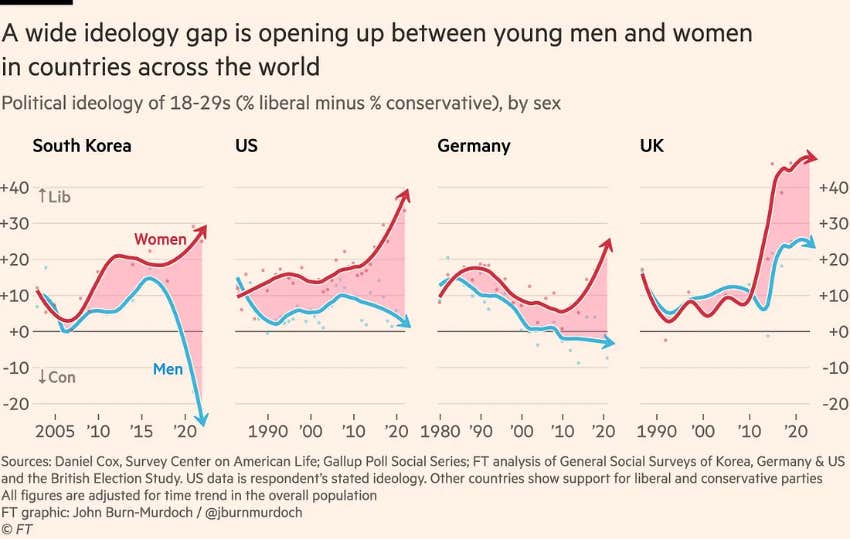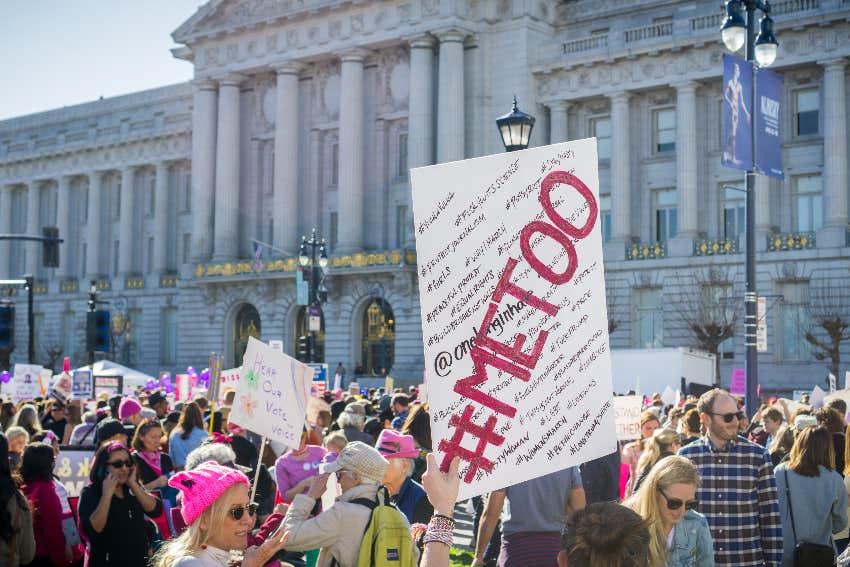Why Are Gen-Z Men Regressing?
As Gen-Z women become more progressive, Gen-Z men seem to have regressed.
 Wirestock | Canva
Wirestock | Canva Editor's Note: This is a part of YourTango's Opinion section, where individual authors can provide varying perspectives for wide-ranging political, social, and personal commentary on issues.
Here’s the thing: the late-millennial to older Gen Zers have been the torch-bearers for a brave new world. More young adults aged 18–29 are speaking up against occupational forces, protesting more, acting against climate change, and speaking up for unions. We can all agree that each of these things is a deeply progressive political stance.
But, according to this article in the Financial Times, this political progress owes little to the young men in these generations. This begs the question:
Why are Gen-Z men regressing?
 Photo courtesy of Financial Times
Photo courtesy of Financial Times
Zillennial women are soaring to greater heights of progressiveness while Zillennial men are falling deeper into the trenches of intolerance and conservatism.
According to this chart, as the years go by, more and more women are taking a sharp turn towards liberal ideals — including positive attitudes towards immigrants, other races, religions, and more. Not only are men not following suit, but they’re directly opposing women’s trajectory and going the conservative way.
The interesting thing about the chart itself is that it’s taken from the work of one Daniel A. Cox, Director of the Survey Center on American Life, who has written a shockingly similar piece called The Despair of Young Liberal Women.
His first theory is that when women become “more woke,” men’s instinct is to oppose them, seemingly out of insecurity.
He quotes Gallup Polls saying that there is a heightened level of dissatisfaction shown by women who self-identify as liberal based on the treatment of women in the US in the past few years.
But he seems to chalk this up to #MeToo. Not the overriding of Roe v. Wade or that femicide has increased 27% in the past 5 years. It’s #MeToo, a movement started to help women find community and talk about their experience with harassment and assault, which has led to liberal women’s dissatisfaction.
While women have always had a more progressive worldview across all age groups, according to Cox and John Burn-Murdoch, who wrote the piece in the Financial Times, the alarming idea here isn’t the gap itself, but that the gap is widening.
The Gen-Z gender gap is widening — because women are doing better?
 Sundry Photography / Shutterstock
Sundry Photography / Shutterstock
John Burn-Murdoch, the author of the piece on the gender gap in progressiveness, shares some interesting theories on why the gap between genders based on political ideology might be widening.
His first theory is that when women become “more woke,” men’s instinct is to oppose them, seemingly out of insecurity. The words he used are “men feel threatened,” concerning women finally coming out and speaking about intimate violence, specifically in the workplace.
His other theory is that young people are chronically online today, and their devices are echo chambers regurgitating the same ideologies over and over, opposed only by gender.
Alice Evans, a Stanford fellow working on a book about political divergence by gender, makes an interesting point about how the falling economic means for young people might contribute greatly to the hostility between genders.
Interestingly, economic status is mentioned here as there is another gender gap forming regarding this: more young women today are homeowners compared to young men in the US.
Considering the average American man is 132x less likely to own a home than an average American woman as of 2022, one would think men would find marrying these women attractive considering it would up their financial portfolios.
Except, not only are women at large choosing singledom, but American men, in particular, are turning to their passport-bro ways and paying a heavy price for wanting to play their gender role within limited means. There’s a gap between what men want and what men and women are capable of in today’s society.
I have already discussed the poor financial standing of individuals as well as couples in my first-ever article on Fourth Wave. The rampant misogyny in the workplace costs at least 7% of the average wage of men and women annually when more women enter the workforce. Like I said there, I’ll say here:
The average Gen-Z man is not earning enough anymore. He is not a provider, a breadwinner, or any other buzzword we historically associated with large and in-charge men.
In Germany, for example, where 31% of women working full-time were the sole breadwinner or outearned their partner, men showed extremely high levels of relationship dissatisfaction, citing that this thwarted their sense of masculinity.
There’s also a trend of dual-income households in South Korea (59.2%) and the US (53%). But instead of seeing the positives of collaboration, men see the rising economic status of women as a threat to their opportunities.
This rage is spreading so far that the International Labor Organization has a brief on how to tactically engage men in terms of women’s empowerment without threatening their sense of self.
Burn-Murdoch also mentions how feminist discourse is antagonizing men. “I think it’s true that bridging the gap will have to come more from men than women, but I think diagnoses of “toxic masculinity” only exacerbate the problem, causing further negative polarisation.”
Is women’s empowerment a threat to Gen-Z men?
 Yuri A / Shutterstock
Yuri A / Shutterstock
The unabashed truth is this — women’s empowerment is a threat to men who do not believe in egalitarianism. Women’s education threatens men who profit from women’s ignorance. Women’s rights threaten men who wish to violate them. And this is where the gendered political divide begins.
South Korea, the outlier with the most radical movement to decenter men, has seen some heinous femicide in its recent past. The 4B movement — renouncing physical intimacy, dating, marriage, and child-rearing — is not the cause of hate crimes against women but a result of it.
But on the other end of the spectrum, here’s what society has done to men: for generations, we have allowed them to do their worst, but now they are — for the first time — having to do more than just have a well-paid job to hold down a relationship. Or to even have women as friends. Today, many men can’t even hold down a well-paid job.
After eons of letting men coast on a good salary alone to qualify as a “good husband” or “good father,” men have to listen to women tell them exactly what was wrong with that ideology. Y’know, the ideology that lets them be the happy one in the relationship.
No wonder they’re dealing so badly with it all. Instead of adapting to this new reality, young men are holding on to conservative values with no basis in our new world, hoping they can go right back to coasting if they dig their heels in enough.
It’s easier to seek the shrill but comforting voice of an Andrew Tate telling you you have value if all you do is have a job than listening to women saying that’s no longer enough.
I mean, nearly every single man who responded to my first article was raging mad that I was telling him what to do when it would all be solved if women:
- Married down
- Stopped working
- Stopped having standards
- Stopped making more money
None of these men engaged positively, even when I told them exactly what was in it for them if they would only collaborate with women. Just be a little bit helpful. So now, I want to ask the question Burn-Murdoch asked.
Where do Gen-Z men go from here?
If more men continue down a conservative path as they are — wherein men in positions of power are setting laws forcing women into childbirth and motherhood, and potentially someday into marriage — more women will regress even deeper into radical feminist ideology.
Like the slightly conservative Burn-Murdoch and Cox believe that men and women must meet in the middle, I also believe men and women must meet in the middle. If the middle means in the middle of liberalizing.
After all, men liberalizing would mean dropping oppressive views on immigration and women’s autonomy. But women regressing would mean the loss of everything women have fought for to bring us to this level of progress. We are already so far ahead of where we were, we simply cannot stop until we achieve equal value and labor.
This would mean young men will likely continue down their path of least resistance for a while. Until we get even further alarmed about men’s levels of loneliness. Until men watch their friends get into loving partnerships and realize unlearning their archaic understanding of masculinity would probably help them get the same results.
It’s easier to seek the shrill but comforting voice of an Andrew Tate telling you you have value if all you do is have a job than listening to women saying that’s no longer enough.
It would also mean men and women would have to redefine what masculinity and femininity entail — or even if they must exist at all. This would also mean we would have to dismantle the capitalist ideology of human value being subjective rather than inherent.
Until then, we’re simply all going to be swimming against the current and continue engaging in contentious conversations until men are more willing to listen and change.
Sangeeta Kalsi is a UX/UI designer with a love for writing. She has previously written for Mondanite and Vice Arabia in Dubai and currently lives and works in Italy.
